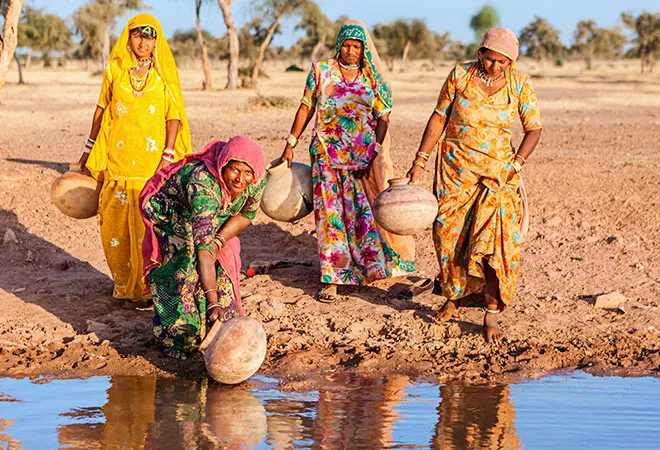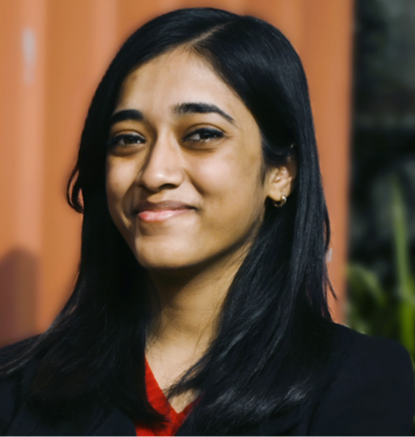-
CENTRES
Progammes & Centres
Location
Gender-sensitising the Water Action Agenda would be critical to ensuring truly inclusive transformations

Water, one of the most essential resources for individual health and well-being, is a universal subsistence need. Access to clean and safe water for all purposes is a fundamental right and critical to ensuring sustainable development for all. SDG 6 (Clean Water and Sanitation) under Agenda 2030 aims to “ensure availability and sustainable management of water and sanitation for all”. However, meeting the targets set under this goal would require a 4X increase in the pace of transformations witnessed so far concerning the provision of safe drinking water, hygiene, and sanitation.
World Water Day 2023 (March 22) will mainly focus on the United Nations Educational, Scientific and Cultural Organization (UNESCO) engaging with key stakeholders to drive solutions to accelerate the mitigation of the water crisis. The Water Action Agenda will be launched at the United Nations 2023 Water Conference to ensure water for health, development, and climate resilience through cooperation and collective action. However, gender-sensitising the Water Action Agenda would be critical to ensuring truly inclusive transformations. Target 6.2 under SDG 6 aims to “achieve access to adequate and equitable sanitation and hygiene for all and end open defecation, paying special attention to the needs of women and girls and those in vulnerable situations” by 2030. However, no gender-specific target addresses water access limitations for all purposes. This article will explore the ‘gender-water access-time poverty’ nexus to highlight the economic challenges confronting women with limited access to water and strategies that can be used to address them.
The Water Action Agenda will be launched at the United Nations 2023 Water Conference to ensure water for health, development, and climate resilience through cooperation and collective action.
Access to water and time poverty: From a gender lens
Communities worldwide, particularly in low- and lower-middle-income countries, remain vulnerable to water availability, quality and access limitations – disproportionately affecting women and girls. Limited access to water and hygiene directly impacts nutritional security, health and well-being and puts women and girls at risk of violence and harassment, particularly in public spaces. Besides its social implications, limitations in water access are crucial in restricting women’s economic spaces. Limited access to water can increase the opportunity cost of time for women. This is because when women spend significant time collecting water, they have less time available for other activities, such as education or paid work. As a result, women often have to forego opportunities that could improve their economic and social well-being.
According to UN Women, across 80 percent of water-poor households, women and girls are responsible for water collection. This not only subjects them to a physically demanding task but is time-consuming and prevents them from pursuing education or other livelihood opportunities. Social norms and traditional gender roles play a significant role here. The responsibility often falls on women and girls because men’s role as the bread-earner of the household is accorded priority over women’s livelihood activities and other domestic duties. As a result, women and girls often have to walk long distances to collect water, possibly several times a day. Besides being a physical burden, water collection directly impacts women’s education and economic opportunities, making them time-poor.
Limited participation in education or economic life can perpetuate economic and social inequalities among men and women, significantly impacting overall social well-being. Estimates suggest women and girls spend approximately 200 million hours each day on average collecting water worldwide, which restricts their economic participation making them 25 percent more likely to live in extreme poverty.
The responsibility often falls on women and girls because men’s role as the bread-earner of the household is accorded priority over women’s livelihood activities and other domestic duties.
Women remain time-poor for various reasons, including care activities and unpaid domestic work – limited water access is a primary challenge in this regard. Mainstreaming gender considerations in the Water Action Agenda can be one of the ways to address women’s time poverty and safeguard their economic and social agency. Economic empowerment of women has significant positive spillovers on families, communities, and societies as a whole. Women are more likely to invest in children’s nutrition, education, and healthcare services. Economically independent women are also more likely to participate in social, political and civic processes in decision-making roles, ensuring more inclusive and equitable social outcomes.
Advancing gender-inclusivity
Addressing specific challenges confronting women and girls regarding access to water, hygiene, and sanitation through gender-responsive policies and programs can help promote gender equality through the UN Water Action Agenda. Specific programmes like Water, Sanitation and Hygiene for Health (WASH) Program in Ethiopia, Women-Led Water Supply Sanitation and Hygiene Program in Nepal, Community-Led Total Sanitation Program in Malawi, the WASH United Initiative in India, the GIZ Regional WASH Programme in West Africa and the Water For Women Fund in the Pacific have been adopted across countries and regions to ensure women’s access to WASH services and enabling their participation in water policy formulation contributing to their economic empowerment and gender equality.
Economically independent women are also more likely to participate in social, political and civic processes in decision-making roles, ensuring more inclusive and equitable social outcomes.
Taking cues from these programmes, several strategies can feature in the Water Action Agenda to be launched at the UN 2023 Water Conference that addresses the intersection of gender, water access and time poverty. First, there is an urgent need to mobilise investments in gender-responsive WASH infrastructure that cater to the specific needs of women, located closer to the households. Second, efficient water management training at the household or community level can directly reduce the number of times water must be collected from distant sources, mitigating time poverty. Third, women’s role in decision-making processes related to water access must be promoted to ensure their social agency and formulation of suitable strategies that can address related issues. Fourth, addressing social norms and gender stereotypes through community-based education and awareness campaigns can help secure greater involvement of all household members and sharing of responsibilities to address women’s time poverty. Fifth, gender-disaggregated data collection and analysis can help identify the needs and priorities of women concerning water access and guide policy formulation and roll-out. Lastly, building extensive partnerships among governments, civil society organisations, and the private sector can help strengthen gender inclusivity within the Water Action Agenda through knowledge and expertise sharing and efficient resource mobilisation for transformative outcomes.
The views expressed above belong to the author(s). ORF research and analyses now available on Telegram! Click here to access our curated content — blogs, longforms and interviews.

Debosmita Sarkar is an Associate Fellow with the SDGs and Inclusive Growth programme at the Centre for New Economic Diplomacy at Observer Research Foundation, India. Her ...
Read More +